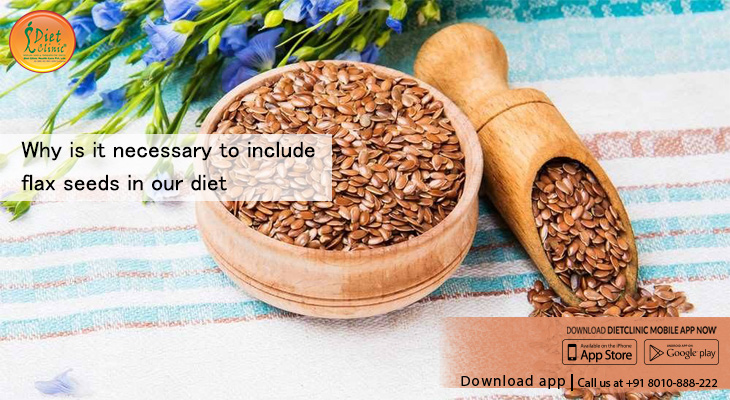
Dietician Sheela Seharawat
Have you heard of Flaxseeds or linseeds? They are known as Alsi in Gujarati, hindi and Punjabi, Jawas in Marathi, Tishi in Bengali, Agasi in Kannada. Now, you must have guessed what are these flaxseeds.These seeds are obtained from flax, one of the oldest fiber crops in the world- known to have been cultivated first in ancient Egypt and China. The flaxseeds are a rich source of micronutrients, dietary fiber, manganese, vitamin B1 and essential fatty acid, alpha-linolenic acid or ALA or omega-3 fatty acid. Studies have shown that flaxseeds can lower the risk of cancer, diabetes and heart disease.
There are two types of flaxseeds – Golden flaxseeds and brown flaxseeds. Their nutrient content are very similar and they have the same number of short chain omega 3 fatty acids.
Nutritional value of Flaxseed per 20 g (2 tbps)
Energy - 54.7 kcal
Carbohydrates - 3.0 g
Sugars - 0.2 g
Dietary fiber - 2.8 g
Fat - 4.3 g
Saturated fat - 0.4 g
Monounsaturated fat - 0.8 g
Polyunsaturated fat - 2.9 g
Protein - 1.9 g
Thiamine (vit B1) - 0.2mg
Riboflavin 0.0mg
Niacin (vit. B3) - 0.3mg
Pantothenic acid (B5) - 0.1mg
Vitamin B6 - 0.0 mg
Folate - 8.9 mcg
Vitamin C - 0.1 mg
Calcium - 26.1mg
Iron - 0.6mg
Magnesium - 40.2 mg
Phosphorus - 65.8mg
Potassium - 83.3 mg
Zinc - 0.4mg
Health benefits of flaxseeds:
Rich in Fiber – Flaxseeds are rich in both soluble fiber and insoluble fiber. Soluble fiber dissolve in water to make a gel like substance that helps in lowering blood glucose and blood cholesterol levels and insoluble fiber adds bulk to the digestive tract by absorbing water and helps move things more quickly down the digestive system.
Flaxseeds contain Lignans, a type of phytoestrogens (estrogen –like chemical compounds which function like an anti –oxidant by scavenging free radicals in the body)
Flaxseeds contain omega 3 fatty acids, a type of essential fatty acids which cannot be synthesized by the body, they need to be supplied through diet. These omega 3 fatty acids are good fats as they are beneficial for heart.
Flaxseeds are very low in sodium and cholesterol and it also helps in reducing high blood cholesterol levels. High cholesterol levels if left untreated can cause blockage in arteries causing stroke or heart attack. So, flaxseeds should be definitely included in the diet.
Protects against cancer – consuming flaxseeds help in fighting against prostate, colon and breast cancers. The omega-3 fatty acids prevents the malignant cancerous cells from attaching to the body cells. Also, the lignans present in flaxseeds can stop tumors from forming new blood cells.
Protecting against radiation – studies have shown that a diet rich in flaxseeds can protect skin tissues from getting damaged by radiation. The reason is that flaxseeds have anti oxidants and anti-inflammatory properties helps protect the skin tissues from radiation damage.
Improving blood sugar – According to a study published in Nutrition Research the glycemic control in obese men and women can be improved if they consume flaxseeds everyday thus reducing the risk of diabetes in obese people.
Preventing hot flashes - Consuming flaxseeds can decrease the risk of hot flashes in postmenopausal women. Not only this, flaxseeds have positive effect on the overall health and psychological benefits as well.
Flaxseeds can definitely be included in our daily diet but few people should be cautious about consuming flaxseeds:
Pregnant women should avoid flaxseeds to stay on a safer side. As some doctors believe that flaxseeds have estrogen-like properties which may affect pregnancy outcome.
Also people suffering from irritable bowel syndrome should also avoid flaxseeds due to its high fiber content.
Side effects that can be caused by consumption of flaxseeds in some people are:
- Diarrhea
- Bloating
- Constipation
- Flatulence
- Stomach pains
- Nausea


.png)







